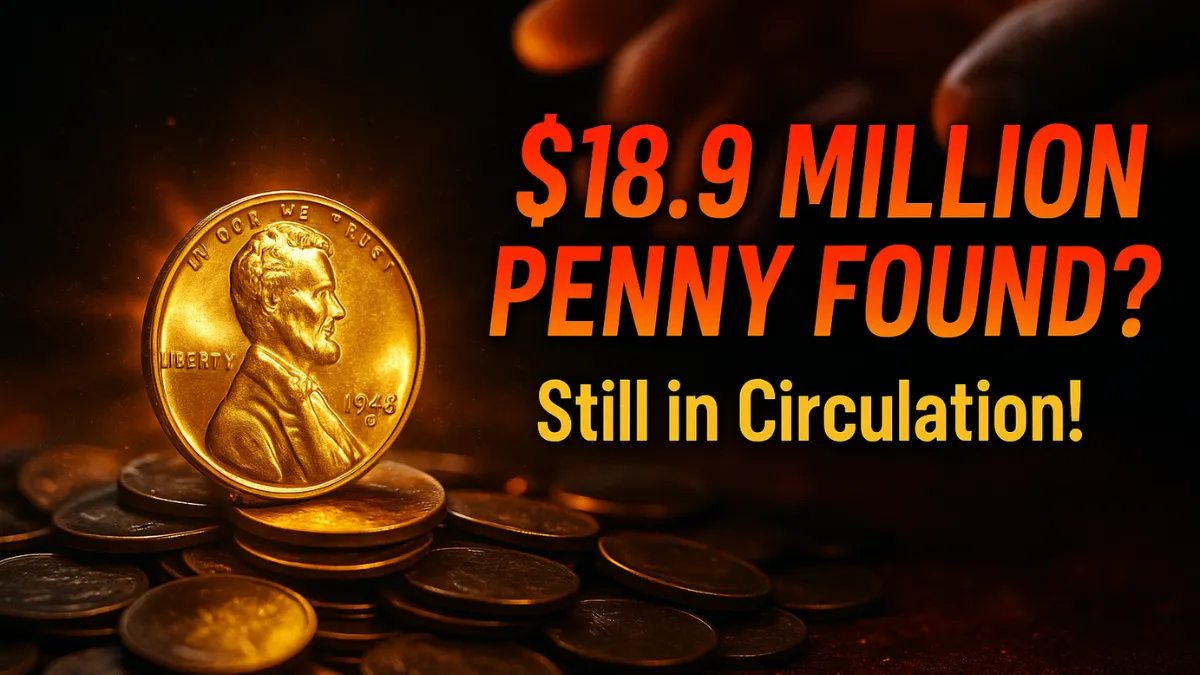What if you discovered a small coin in your pocket, one that could change your life? It may sound like a fantasy, but it’s more possible than you think. A rare Lincoln Wheat Penny, worth an astounding $18.9 million, could still be circulating in everyday transactions!
This incredible tale has captured the imaginations of collectors, history enthusiasts, and lucky coin hunters everywhere. Let’s explore the fascinating details behind this valuable penny and how you could stumble upon it.
What is the Lincoln Wheat Penny?
The Lincoln Wheat Penny holds a significant place in U.S. coinage history. First issued in 1909, this coin was the first to feature a real American figure—President Abraham Lincoln.
On the reverse side of the coin, you’ll find two stalks of wheat, which symbolize prosperity and abundance, leading to its nickname: the Wheat Penny.
Here’s a quick breakdown of its features:
| Feature | Details |
|---|---|
| First Issued | 1909 |
| Obverse (Front) | Portrait of Abraham Lincoln |
| Reverse (Back) | Two wheat stalks |
| Minting Ended | 1958 |
| Metal Composition | Mostly Copper (except special years) |
Though millions were minted, only a select few have become extremely valuable due to unique characteristics, rare mistakes, or special metal compositions.
What Makes One Penny Worth $18.9 Million?
Among the many Lincoln Wheat Pennies, one stands out, valued at an unbelievable $18.9 million. What makes this coin so valuable?
The answer lies in its material.
In 1943, during World War II, copper was in high demand for military production. As a result, the U.S. Mint switched to making pennies from zinc-coated steel rather than copper. However, a few bronze blanks (the traditional material) were left in the machines by mistake.
Consequently, a handful of 1943 pennies were made from bronze instead of steel. These are among the rarest and most sought-after coins in history.
Here’s a quick comparison:
| Year | Material | Notes |
|---|---|---|
| 1943 | Steel | Standard wartime production |
| 1943 | Bronze | Rare error—only a few exist |
A bronze 1943 Lincoln Penny recently sold for a record $18.9 million, making it one of the most expensive coins ever sold.
Why Is It Still in Circulation?
If this penny is so rare, how is it still in circulation?
The truth is, not every rare coin has been discovered. Many coins end up in old piggy banks, drawers, or jars, where they are passed around in regular transactions. Since most people don’t carefully examine pennies, these rare treasures may still be out there.
That’s why collectors and treasure hunters are scouring their change. You could be the next person to find a coin worth millions!
How to Spot a Rare Lincoln Wheat Penny
If you’re interested in searching for a treasure, here’s how to identify a rare Lincoln Wheat Penny.
- Check the Date Look for a 1943 penny, especially one made from bronze (a copper color).
- Check the Color
- Steel Pennies (1943 Standard): Silver-gray color.
- Bronze Penny (Rare): Copper or reddish-brown color.
- Use a Magnet Here’s a simple test:
- Steel pennies are magnetic.
- Bronze pennies aren’t.
- Get Professional Authentication If you believe you’ve found a valuable coin, it’s important to have it authenticated by a trusted coin dealer or grading service like PCGS or NGC. They can confirm its authenticity and value.
Other Valuable Lincoln Wheat Pennies to Watch For
Even if you don’t come across the $18.9 million penny, many other Wheat Pennies can be worth hundreds or even thousands of dollars!
| Year | Potential Value Range | Notes |
|---|---|---|
| 1909-S VDB | $700 – $60,000 | First-year penny with designer’s initials |
| 1914-D | $300 – $5,500 | Low mintage year |
| 1922 (No D) | $500 – $30,000 | Missing mint mark |
| 1931-S | $75 – $1,000 | Low production in San Francisco |
Look out for:
- Unusual mint marks
- Minting errors (like doubled dies)
- Unique colors or surfaces
Why Are Rare Coins So Valuable?
Rare coins are valuable for a few key reasons:
- Scarcity: Fewer coins mean higher demand.
- Historical Significance: Coins tied to major events (like WWII) are highly sought after.
- Condition: Coins in better condition are worth more.
- Mystique: The allure of finding a “common” coin worth millions is captivating.
Collectors love rare coins because they’re not just valuable—they’re pieces of history!
Final Thoughts: Could You Be Holding a Fortune?
Imagine carrying around a simple penny, unaware that it could be worth a fortune. That’s the magic behind the Lincoln Wheat Penny valued at $18.9 million.
So next time you get change, take a moment to inspect it carefully. Check old jars, dusty coin collections, or even your grandparents’ piggy banks. You never know when you might uncover a hidden treasure!
Stay curious, stay observant, and keep your eyes on your coins—your millionaire moment could be just a penny away!
FAQs
How can I tell if my 1943 penny is bronze?
Check its color and magnetism. If it’s copper-colored and doesn’t stick to a magnet, it might be the rare 1943 bronze penny.
Are all Lincoln Wheat Pennies valuable?
Not all are valuable, but rare ones with errors, specific mint marks, or low production can be worth hundreds or even thousands of dollars.
What should I do if I find a valuable penny?
Have it authenticated by a reputable coin dealer or grading service to verify its value and authenticity.
Why are rare coins worth so much?
Rare coins are valuable because of their scarcity, historical significance, condition, and the intrigue surrounding them, especially if they’re linked to major events.
